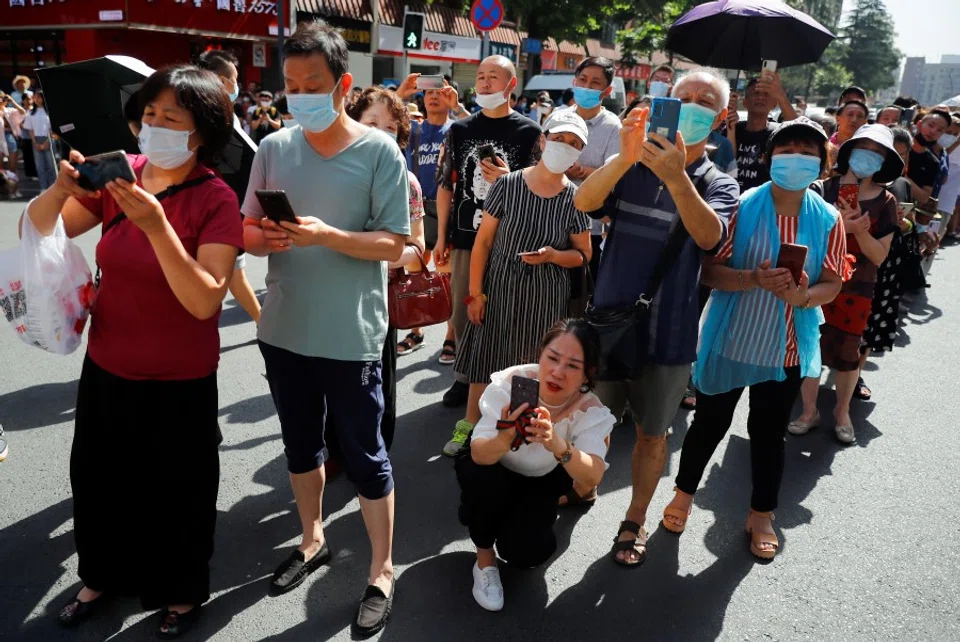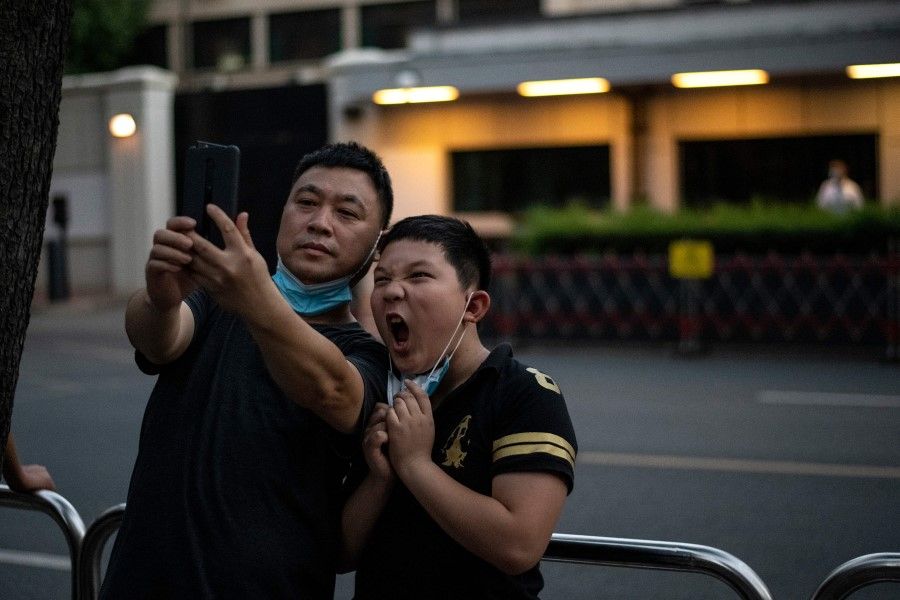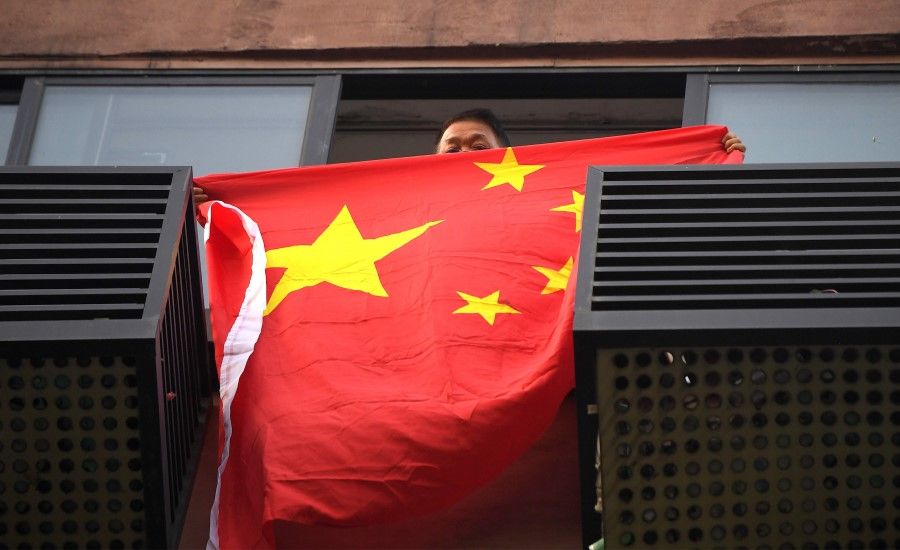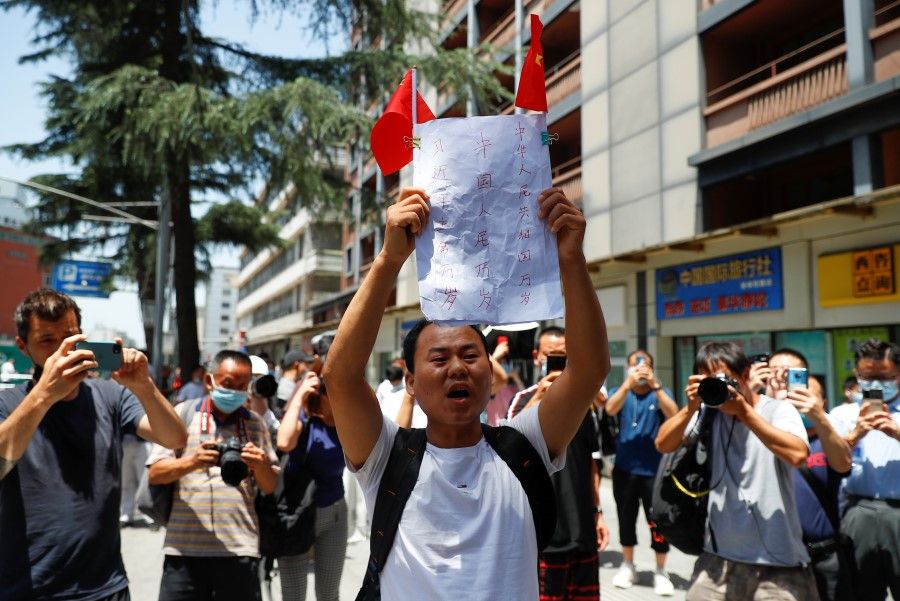'Melon-munching crowd' in China enjoying the show amid US consulate closure

With the lowering of the US flag at the US consulate in Chengdu yesterday, the row between China and the US seems to be taking a pause, at least for now. This diplomatic crisis - the most serious since diplomatic ties were established, involving the retaliatory closure of consulates on both sides - has significantly increased the chances of the two countries decoupling.
Observers are calling it "crazy", while the chattering masses (吃瓜群众, chigua qunzhong, Chinese internet slang, literally "melon-munching crowd") in China have made this already crazy incident in international politics even more ridiculous.
...the US consulate in Chengdu became the place for internet celebrities to be seen.
Chengdu's highest temperature yesterday was at a roasting 37 degrees Celsius, yet passions ran even higher among the crowd that turned up to witness the closure of the consulate. These people gathered around the building with hats and umbrellas against the blazing sun, enthusiastically taking photos and videos.

In retaliation against the sudden closure of the Chinese consulate in Houston, on 24 July China announced it was revoking the license for the establishment and operation of the US consulate in Chengdu and asking for it to cease all operations and events. Following this tit-for-tat action, the US consulate in Chengdu became the place for internet celebrities to be seen.
Official media CCTV rushed to the scene to set up cameras for multi-angle livestreaming of everything happening around the consulate before its closure.
While most of the footage was of the main gate - which was shut - and passersby in a hurry, this performance art-type live broadcast gained a lot of attention, with over 20 million people watching online at one point.
Amid the unanimous cheers, there was a sense of self-satisfaction, a euphoria that comes from standing up to others.
As of yesterday evening, CCTV's live broadcast on Weibo had gathered over 460,000 comments. It sounded like a party zone, with netizens celebrating and seemingly looking forward to the deterioration of China-US relations. Amid the unanimous cheers, there was a sense of self-satisfaction, a euphoria that comes from standing up to others.
One netizen said mockingly, why not turn the consulate building into a hotpot store and call it Trump Hotpot? The verified Weibo account of the Communist Youth League of China subtly flexed the muscles of China's 5G capabilities with its reply: "With 5G, we can do anything; everything can be livestreamed." Someone else said fire trucks were in position outside the consulate, ready for US diplomats to start burning documents following the order to close the consulate, as happened at the Chinese consulate in Houston.

Apart from the extraordinary online drama, there has been no lack of an offline audience either. This past weekend, people posed for photos waving the Chinese flag outside the consulate, while some people did "anti-US" livestreams, singing patriotic songs, only to be asked to leave by security before getting into their stride. The crowd spilled over to the eateries around the consulate, which saw better business than usual.
Some people even let off firecrackers in the street outside the consulate, leading to a "blooper" by a CGTN reporter who was doing a live telecast nearby. The reporter solemnly told the audience that the noise had come from a wedding in the community and there was no need to panic. This clip sparked a fresh wave of attention on the internet.
Some even call for blood and advocate breaking off diplomatic ties, showing the lack of responsibility, judgement, and consequence that comes with a "melon-munching" attitude.
The US fired the first salvo in this row. It was an unusual diplomatic move to suddenly demand the closure of the Chinese consulate in Houston. An academic in Chinese international relations noted that such sanctions are usually made in response to serious misdeeds by the other party, but apart from lashing out at China, the US did not produce clear evidence of its criticisms against the Chinese consulate in Houston. To some extent, asking China to close the consulate was a gesture of humiliation.
This confrontational attitude, coupled with the long tussle between China and the US in trade, technology, media and other areas, has catalysed the anger and resentment among the Chinese. In this incident, most Chinese are supportive of hitting back strongly, which reveals the true sentiments of the people. In this sense, there is nothing wrong with the people in Chengdu joining the crowd and taking photos to remember the historic moments before the closure of the consulate. However, amid this celebratory atmosphere, many people are there just to "watch the show", while others post strong nationalistic views and "wolf-warrior" comments. Some even call for blood and advocate breaking off diplomatic ties, showing the lack of responsibility, judgement, and consequence that comes with a "melon-munching" attitude.
From China's decision to close the consulate in Chengdu - which handles relatively fewer consular affairs - China's response is proportionate and not an overreaction, showing that the authorities still hope to keep differences under control.

Led by this melon-munching attitude, Chinese media is also fuelling the flames. The closure of the US consulate in Chengdu is newsworthy, and high media interest is normal. But does the media need to do live broadcasts? That bears discussion. Is it to allow the whole of China to witness the deterioration of China-US relations? Or to play it "tough" and stir up emotion, after being at a disadvantage in the first round of the diplomatic competition? Or to provide a platform for netizens to criticise and let off steam, or a space to cheer and celebrate?
...if nationalistic sentiments are sparked, the authorities' efforts to keep differences under control might be wasted.
Since the trade war, China-US relations have gone downhill, to the point of acrimoniously closing consulates and expelling staff, which many did not expect. From China's decision to close the consulate in Chengdu - which handles relatively fewer consular matters - China's response is proportionate and not an overreaction, showing that the authorities still hope to keep differences under control.
The confrontation between China and the US will probably last for a while. While psychological preparedness is important, if nationalistic sentiments are sparked, the authorities' efforts to keep differences under control might be wasted. There will be even less room to salvage China-US relations, which are already on the brink of going out of control.
